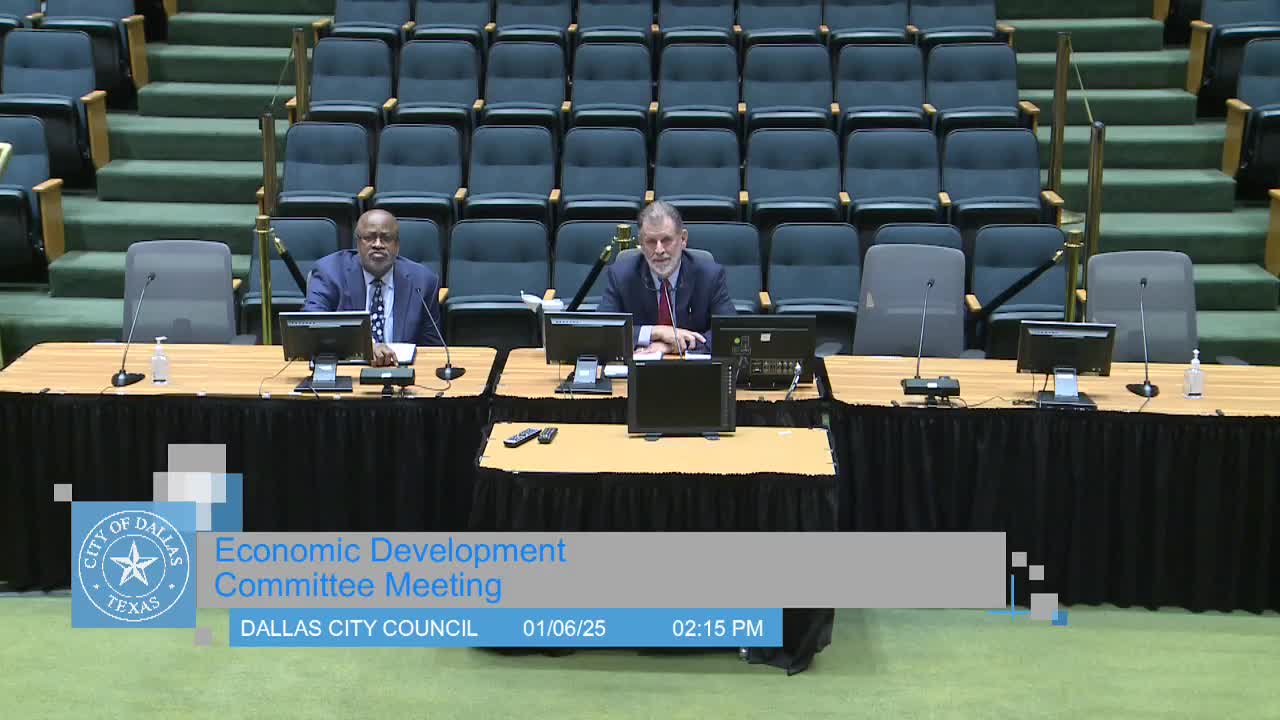Committee briefed on Willow Ranch MUD petition: 140 acres in Kaufman County; $28 million in improvements planned, bonds repaid by district property taxes
Get AI-powered insights, summaries, and transcripts
Subscribe
Summary
City planning staff and the petitioner’s attorney briefed the committee on a petition for a municipal utility district (Willow Ranch) covering about 140 acres in Kaufman County within Dallas’s ETJ; petitioners seek authority to issue tax‑exempt bonds for roughly $28 million in infrastructure.
Emily Liu, director of Planning and Development, and Andrew Gillis, deputy director, briefed the Economic Development Committee on a petition seeking the city’s consent to the creation of a municipal utility district (MUD) known as Willow Ranch. The petition concerns approximately 140 acres located in Kaufman County within five miles of the Dallas city limit and therefore subject to the city’s extraterritorial jurisdiction (ETJ).
Liu explained the purpose and limits of a MUD: a limited-purpose government district typically used to finance and provide water, sewer, drainage, roadway and related infrastructure; it may issue tax-exempt bonds, enforce planning and environmental regulations, but it cannot enforce city zoning while in the ETJ. The petition indicates planned improvements totaling over $28,000,000 and a tentative concept plan that calls for roughly 640 equivalent single-family connections.
Victor Christales, attorney for the petitioner, told the committee that bonds issued by the MUD would be repaid from ad valorem taxes levied only on property within the district: “The payment of the bonds would be the ad valorem taxes that are levied only to the residents of the district within the bounds of the MUD itself,” he said. He added that if the property were annexed by a city in the future, any outstanding debt could be assumed by the annexing municipal entity, though he said that outcome is rare.
The city staff memo notes there is no cost to the City of Dallas for the creation of the MUD; city approval is a consent step required by state law because the property sits in Dallas’s ETJ. If the city grants consent, the next step is submission of a full creation application to the Texas Commission on Environmental Quality (TCEQ), which the attorney estimated would take about six to eight months to process.
Committee questions focused on who bears the tax liabilities and how notice is provided to future buyers. Committee members pressed for confirmation that only district property owners would be responsible for bond repayment and asked whether there would be notice and signage requirements. The petitioner’s attorney and staff said the state requires recorded notices in county property records and signage at major entrances; staff said the petitioner had obtained landowner consent (the property is currently undeveloped) to petition for creation.
Why this matters
A MUD can enable development by allowing infrastructure to be financed up front and repaid through district property taxes, but it also creates long‑term tax obligations for lots and homeowners within the district; annexation would transfer outstanding obligations to the annexing city. The committee received the informational briefing; transcript records no formal committee vote on consent.
